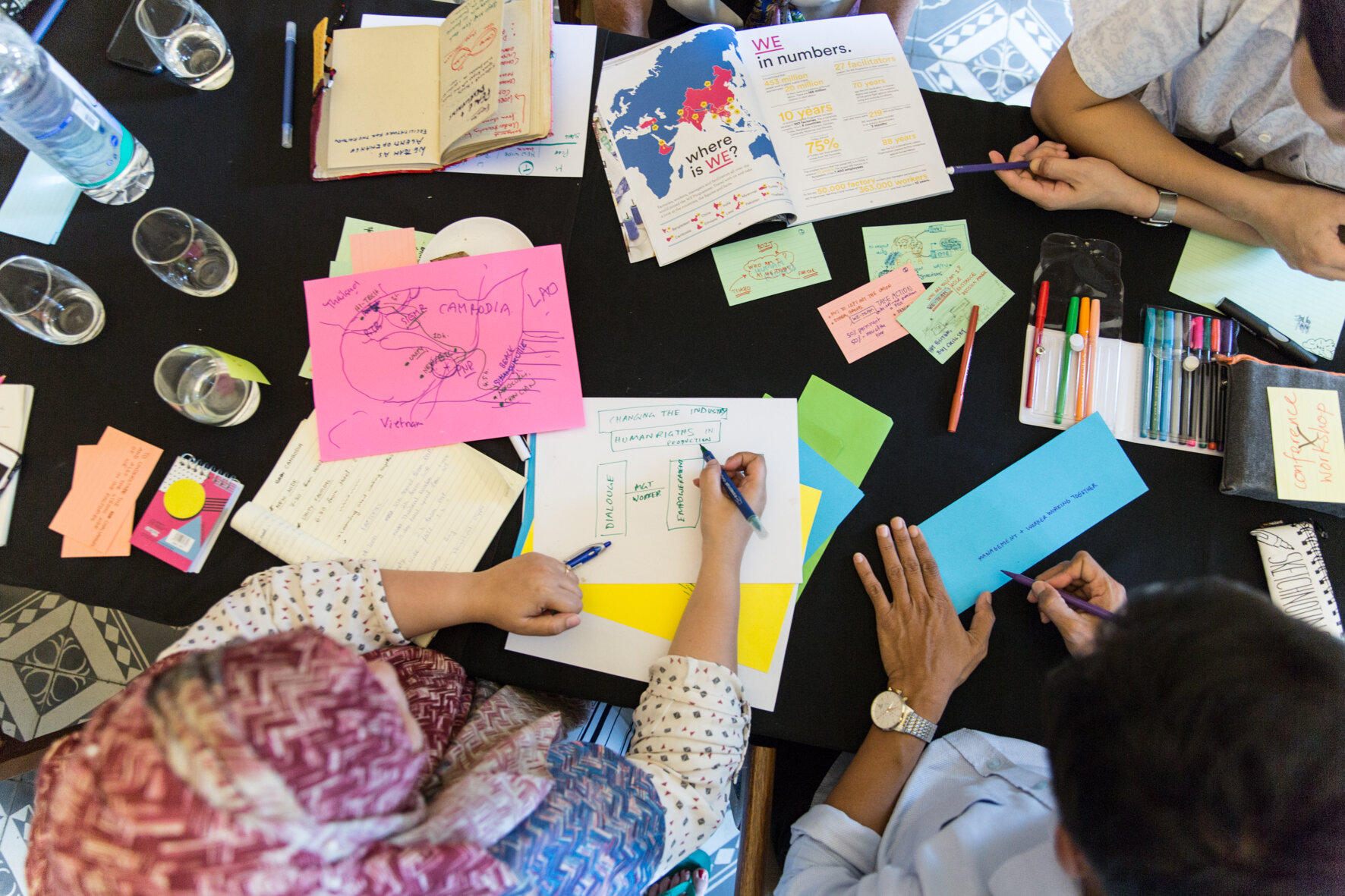Human rights
Sector programs

In our industries, we often have to deal with challenges that are systemic. They are deeply rooted in the globalized economy. For example, low wages, dangerous jobs or child labor. We cannot make progress on these issues alone. We need far-reaching change. To achieve this, politicians, companies, employers' associations, trade unions and non-governmental organizations must all pull together. That is why we are involved in various initiatives - both at industry level and beyond. Together, we are changing ourselves and the world for the better.
Sector-wide approaches are our answer to the challenges facing our industries. However, new and systemic solutions take a lot of time, they deal with complex problems and need to integrate those affected. Their progress may seem small-scale and not immediately obvious, but they are very valuable for the systemic change we are striving for.


Focusing on people: In the long term, working standards can only be established and secured in the long term if employees have the opportunity to represent their interests themselves. Our aim is to strengthen the voice and rights of workers. We promote social dialog: Employees must have the opportunity to represent their rights themselves and it is important to us that the interests of workers and other stakeholders are represented in our initiatives. Workers' representatives and trade unions are the instruments that enable them to demand and monitor compliance with their rights in the workplace in the long term.
In 2012 - just one year before the devastating factory collapse at Rana Plaza - Tchibo played a key role in negotiating the Accord on Fire and Building Safety in Bangladesh. Today, it is the world's most successful initiative to improve working conditions in the textile industry. By 2021, 190 brand companies had joined, bringing 1,600 factories and over two million people in Bangladesh into the program. Before the Accord, the factories were in a poor state. Work could be life-threatening for workers. Today, workers in the factories are better protected. Since the Accord was founded, there have been no fatal fires or collapses in the participating factories. This was only possible thanks to the cooperation of companies, producers, trade unions and the non-governmental organizations involved. Since June 2020, the implementation work of the Accord in Bangladesh has been incorporated into the Ready-Made Garments Sustainability Council (RSC), an independent national organization in which brand companies, the trade union associations IndustriALL Global Union and UNI Global Union as well as the Bangladeshi textile industry associations BGMEA and BKMEA (Bangladesh Garment/Knitwear Manufacturing and Export Association) work together as equal partners. Following an extension of the Bangladesh Accord in 2018, it was merged into the newly founded International Accord for Health and Safety in the Textile and Garment Industry in September 2021. The signatory companies are committed to continuing the work of the Accord in Bangladesh. Tchibo had clearly spoken out in favor of an extension and expansion together with the global trade unions and was one of the first companies to sign the new agreement.
Our aim is to ensure that Tchibo products are produced under fair conditions. This also includes ensuring that people in our supply chains receive a living wage. In the ACT (Action, Collaboration, Transformation) initiative, we want to achieve living wages in the textile industry with over 18 global brand companies and IndustriALL. Our vision is regular wage negotiations between trade unions and employers in the entire textile industry of a country, combined with better purchasing practices and long-term business relationships between the purchasing companies. In this way, wages can increase step by step until they reach a living wage level. We adapt our purchasing practices to allow manufacturers long-term planning and financial security. This enables the payment of higher wages. This also includes fair payment terms. A core of our ACT commitments: We work with our producers to ensure that wage and labor costs are a fixed part of price calculations and are therefore excluded from price negotiations. Once an industry-wide collective agreement has been negotiated in a country, we commit as a community of ACT companies to keep our purchasing volume in that country at least at the same level for several years. This supports long-term change and gives the social partners time and energy for regular wage negotiations. The ACT focus countries: Bangladesh, Cambodia, Turkey, Myanmar (until 2021).
Tchibo has been a member of the Partnership for Sustainable Textiles since 2015. Here, companies, associations, politicians, non-governmental and standard organizations, trade unions and scientists work together to improve social and ecological standards in the supply chains. The Textiles Partnership offers us, as the German textile industry, the opportunity to establish common standards and implement them jointly. The Textiles Partnership is a so-called multi-stakeholder partnership. As many German stakeholders in the textile and clothing industry as possible should be members. This includes large retailers such as Tchibo, traditional German textile and shoe manufacturers and smaller fair fashion brands, as well as trade unions, NGOs such as the Clean Clothes Campaign and Transparency International, and the political players who create the framework conditions for our actions. The Partnership cooperates with international initiatives that are committed to a sustainable and future-proof textile industry, such as the Fair Wear Foundation, ACT on Living Wages and the Sustainable Apparel Coalition. This reinforces the positive learning and implementation effects for the members and makes the Partnership even more valuable for us.
Tchibo is a member of the following Partnership Initiatives in the Partnership for Sustainable Textiles:
> Alliance initiative Tamil Nadu\n
> Climate Protection Expert Group
> Natural fibers expert group
In the alliance initiative Tamil Nadu, we are working together with the German Federal Ministry for Economic Cooperation and Development (BMZ), the non-governmental organization FEMNET e.V. and the companies Hugo Boss, KiK and Otto Group to systematically improve working conditions in the textile and clothing industry in the Indian state of the same name, especially for women and girls in spinning mills. The non-governmental organization SAVE is implementing the programme locally and initiating changes on several levels: A dialogue is intended to raise awareness of workers' rights among key stakeholders in the local textile industry, including the government. In addition, a training program accompanies the planned establishment of the legally required complaints and arbitration committees in spinning mills and factories. Workers and management are informed about their labor rights and grievance mechanisms. After the end of the first project phase in September 2020, we have been continuing the project in a second phase since November 2021.
In September 2016, Tchibo was the first retail company in Germany to conclude a framework agreement with IndustriALL Global Union for our non-food supply chains - as an international framework agreement to strengthen labor rights.
In addition to our Social and Environmental Code of Conduct, it ensures that workers have the opportunity to organize themselves into trade unions and engage in collective bargaining. The agreement should make it easier for them to negotiate wages, benefits and working hours with local trade unions within the company and across the industry. It strengthens our commitment to trade union rights and social dialogue and thus also the area of freedom of association and employee representation in the WE program.